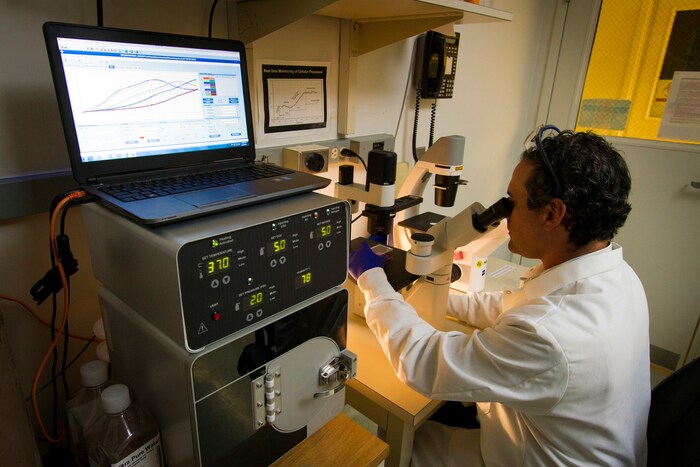What is Biophysics?
Biophysics is an interdisciplinary field that applies physics and biology ideas to understand better the mechanisms underpinning biological processes. Biophysicists use quantitative approaches and analytical tools to investigate various issues, including the structural features of biological molecules and the kinetics of cellular processes. Biophysics has numerous real-world applications; for example, biophysicists play an important role in developing medical imaging technologies such as MRI and PET scans, which are required for illness diagnosis. Furthermore, their work in drug design and molecular modeling substantially contributes to advances in pharmaceuticals and biotechnology, ultimately improving healthcare outcomes and deepening our understanding of life at the molecular level.
This blog post aims to shed light on the vast opportunities a degree in biophysics offers, highlighting its unique benefits to the scientific community and the challenges students and professionals might face. Through this exploration, we seek to provide valuable insights for aspiring biophysicists, demonstrating how this degree can serve as a key to unlocking a world of innovative research and promising career paths.
Benefits of Obtaining a Biophysics Degree
One of the benefits of pursuing a biophysics degree is acquiring a multidisciplinary skill set. Biophysicists are not confined to a single domain of knowledge; they apply concepts from biology, physics, chemistry, and mathematics to solve complex problems. This comprehensive skill set is exceedingly valuable, enabling practitioners to approach scientific inquiries holistically. It also fosters versatility, allowing biophysicists to adapt to various research areas and technologies that are continually evolving. Adaptability is crucial in today’s fast-paced scientific environment, setting biophysics graduates apart in the job market.
The high demand for biophysicists across various sectors further underscores the value of this degree. In academia, private industry, government, and nonprofit organizations, the unique expertise of biophysicists is sought after for its potential to drive innovation and progress. This broad spectrum of career opportunities reflects biophysics’ fundamental role in advancing our understanding of biological systems and developing practical solutions to real-world problems. Consequently, graduates will likely find many career paths, ranging from research and development to policy-making and education.
Furthermore, biophysicists often find themselves at the forefront of groundbreaking research. By applying physics principles to biological systems, they can explore the mysteries of life at a molecular level, leading to discoveries that can dramatically improve our understanding of health, disease, and the fabric of biological life. It contributes to expanding scientific knowledge and can lead to the development of new medical treatments, diagnostics, and technologies. The ability to make an impact and contribute to research is a compelling benefit of specializing in biophysics, offering a sense of fulfillment and purpose to those in the field.
Lastly, the interdisciplinary nature and high demand for biophysics expertise translate into competitive salaries and substantial career growth opportunities for graduates. The 2023 median annual pay was $107,460 as per the US Labor of Statistics. Biophysicists’ diverse skill sets and ability to contribute to various crucial sectors make them valuable assets in any professional setting. As a result, biophysicists can expect rewarding salaries and promising career advancement prospects, making biophysics an appealing and practical choice for students interested in science. Whether aiming for research, industry, or policy-making leadership positions, a biophysics degree provides a sturdy foundation for achieving professional excellence and success.

Drawbacks of Obtaining a Biophysics Degree
Despite the numerous advantages, many challenges lie ahead for students pursuing a biophysics degree, primarily due to the intense academic and research demands. Biophysics requires a deep understanding of various scientific principles and the ability to perform complex experiments. Students and professionals must dedicate significant time and effort to grasp the theoretical aspects and develop practical skills in the laboratory. This level of commitment can be daunting and may lead to stress and burnout for some individuals. Furthermore, the pressure to publish research findings in prestigious journals and secure funding adds another layer of stress, making the field highly competitive and demanding.
Another drawback is the specialization and niche focus associated with a biophysics degree. While the interdisciplinary nature of biophysics is beneficial in many ways, it also means that professionals are often pigeonholed into specific areas of research or application. This hyper-specialization can limit job opportunities outside one’s narrow field of expertise, making it challenging for biophysicists to transition into broader scientific roles or industries. Additionally, the niche focus of biophysics research may not appeal to employers in diverse sectors who require a more generalized scientific background, thereby restricting the versatility of career paths available to graduates.
Lastly, like any other scientific discipline, biophysics is subject to industry fluctuations and budget constraints. Research funding is often tied to current scientific trends, government policies, and economic conditions, which fluctuate widely. This uncertainty can impact biophysicists’ job stability and growth prospects, as budget cuts or shifts in research focus may result in fewer available positions or reduced resources for ongoing projects. Additionally, as biophysics heavily relies on technological advancements, rapid technological changes could render specific skills obsolete, requiring professionals to continually update their knowledge and adapt to new methods. These industry dynamics make it imperative for individuals in the field to stay agile and responsive to shifts in scientific research and funding.

How to Maximize the Value of a Biophysics Degree
Maximizing the value of a biophysics degree requires a proactive approach, beginning with acquiring practical experience. Engaging in hands-on research projects, internships, and laboratory work provides invaluable insight into the real-world application of biophysics principles. Not only does this enhance understanding and skill development, but it also significantly bolsters a resume, making candidates more attractive to prospective employers. Practical experience facilitates a smoother transition from academic learning to professional application, enabling graduates to contribute effectively to their fields of work from the outset. Additionally, participating in diverse research projects broadens exposure to various biophysics sub-disciplines, potentially opening up more career avenues.
In addition to gaining practical experience, continuous learning is fundamental in a field as dynamic as biophysics. This discipline continually evolves, with discoveries and technological advancements regularly expanding the scope of what is possible. To stay relevant and maintain a competitive edge, biophysicists must commit to lifelong learning through formal education, such as pursuing advanced degrees or certifications, or informal pathways, such as workshops, seminars, and conferences. Continuous education updates one’s knowledge and skills and sparks innovation and creativity, empowering professionals to lead groundbreaking research and contribute to advancing the field.
Networking is critical in leveraging a biophysics degree to its fullest potential. Building professional relationships within the biophysics community can open doors to collaborative research opportunities, mentorship, and job offers. Engaging with peers, mentors, and industry leaders through professional associations, conferences, and online platforms like LinkedIn facilitates the exchange of ideas and can provide guidance and support throughout one’s career. Furthermore, exploring diverse career paths beyond the traditional academic and research roles—such as in biotechnology, pharmaceuticals, policy development, or science communication—can reveal unexpected opportunities where biophysics expertise is highly valued. Being open to various career options and strategic networking can significantly enhance biophysics graduates’ job satisfaction and career success.
Conclusion
In conclusion, a degree in biophysics opens up a world of diverse opportunities, bridging the gap between biology, physics, and other scientific disciplines to address some of today’s most pressing research questions. While it comes with its share of challenges, from the rigorous demand for theoretical understanding and practical research skills to niche specialization and industry fluctuations, the benefits are substantial. Biophysics graduates have a unique skill set that is highly valued across various fields, including academia, biotechnology, pharmaceuticals, and beyond. The key to maximizing the value of a biophysics degree lies in engaging in practical experience, committing to continuous learning, and fostering a strong professional network. These efforts enhance employability and contribute to the field’s advancement and innovation. Ultimately, with the right approach, a biophysics degree can be a gateway to a fulfilling career that offers personal satisfaction and the opportunity to make significant contributions to science and society.















